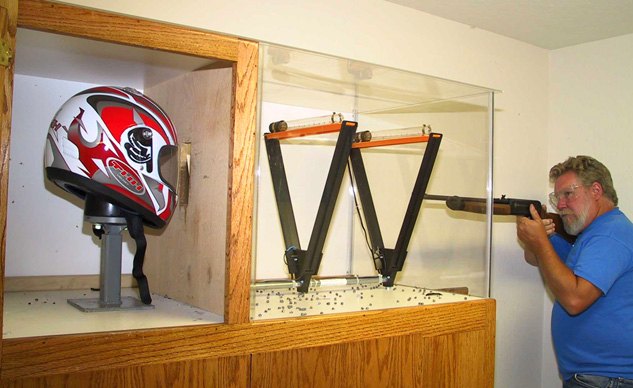Head Shake - Helmet Laws and Sausages
.and other things you may not want to watch constructed
Something unusual happened awhile back. My boss contacted me and wanted me to take a look at copy for an upcoming column coming out, a column written by John Burns. I have a great deal of respect for Mssr. Burns. The body of work John has produced over the length of his career speaks for itself, so what could I possibly add to anything John had to say? But okay, El Jefe wants me to look at something, sure, send it my way.
I opened the file and the title induced flashbacks of the worst sort, “ Whatever! – Dingbats, Dingmen, the AMA and the CDC.” I thought I had left all this well behind me, but it quickly became apparent why this was sent my way.
I am familiar with the AMA, having worked for it; and I’m also familiar with Rob Dingman, having worked with him; likewise the CDC, having attended more than my share of health conferences. And helmet laws, Lord only knows I’ve had my fill of helmet laws, having testified against mandatory helmet laws while in the employ of the AMA for a number of years. For that matter, I compiled and wrote what came to be known as the AMA’s Helmet Handbook back in the day, a guide for grassroots lobbyists and volunteers to use in combating mandatory helmet laws for adults.
You can never escape your past.
I read the piece and I liked it, though I did not agree with John’s conclusion. My boss wanted me to write a response to it, but I suggested we let it ride and see what the responses were. I also advised him that the feedback on that piece would be substantial. It was. There are few issues more controversial in the two-wheeled world than mandatory helmet laws for adults.
Helmet laws are the two-wheeled equivalent of abortion or gun laws. This was never made more evident to me than during one trip to the New Hampshire state house in Concord, wingtips and suit bag in hand, to represent the AMA and its members in a helmet law hearing.
It started out normal enough. We assembled in the committee’s hearing room, but soon the room was packed and overflowing out into the hallway. The turnout was more than they had expected, and more were still coming.
The committee chair made the somewhat unusual move of changing the venue for the hearing to the house chambers. I had not seen that before. We moved, and soon all the chairs were occupied, and then the aisles, then the open space in the rear, then the hallways, and still they were coming. I was sitting there watching this in awe. How many people live in New Hampshire? This was a work day after all.
The committee chair promised that everyone that had showed up and wished to speak would have the opportunity, an opportunity that was taken by what seemed like all present. The house chambers of one of the oldest operating state houses in the United States echoed with the testimony of New Hampshire citizens through the morning, through lunch, and well into the afternoon with no sign of abating. Everybody had something to say, almost all in opposition to the bill.
And then the oddest thing happened…
I’ve seen some strange things in state houses. I once had a committee sing happy birthday to me at the behest of the committee chair, but what happened up in Concord was something I had never seen. The bill sponsor took the podium in the late afternoon. Her eyes were watering, she was all choked up, she spoke to the assembled crowd and apologized for introducing the bill. She explained she had no idea it would generate such resistance. She then withdrew her bill from consideration. The last thing she said was that she really understood now what it meant to, “Live Free or Die,” the state’s motto.
The crowd was ecstatic. I was gobsmacked. Now I really had seen it all. That is how contentious this issue is. With that in mind, I’d just like to expand a little on some of the points John made in his column, and also address some of the comments made by readers. My hope is it might add a little perspective.
First, the easy stuff. As John rightly pointed, the CDC can address both Ebola concerns and helmet use simultaneously. It is what they do, it is what they have always done. Infectious disease and “preventable” injuries are their bailiwick, amongst other things. Similarly, the AMA can address helmet laws, and a whole host of other issues. It is what they do; it is what they have always done. Addressing one does not preclude addressing other issues in the case of either organization. I know this; I’ve been to safety conferences in Atlanta held under the auspices of the CDC and the World Health Organization. Conferences in Portland, Oregon; San Antonio, Texas; and Toronto, Canada, and probably some I’ve forgotten.
These are, truth be told, generally dreadfully boring affairs, but occasionally they yield pure statistical gold, such as the Canadian conference where a University of North Carolina Highway Safety Research Center study was unveiled. That study proved very helpful to us, and a large part of that helmet handbook I put together used data from that study.
Second, some of the comments show a misunderstanding of just what the AMA does and who they represent. The AMA is a member-driven organization, so they represent the interests of their membership. They find out what their interests are by conducting bi-annual surveys of the membership and asking them a variety of questions to get a feel for changes over time and what the members feel are priorities: road issues, off-road issues, everything. Helmet laws are just a small part of what the AMA Government Relations Department does, though an important part. Important because they not only reflect the desire of the majority of the membership, but they also serve as a conduit to some of the best grassroots lobbyists in this nation. Namely, the State Motorcycle Rights Organizations (SMROs) – in some states referred to as ABATE. Also, many SMRO’s interests extend to issues that go far beyond helmet laws to encompass things like bike bans, rider education programs, onerous insurance schemes, and even, occasionally, off-road issues.
These SMROs are as different as the state capitals they roam. Some are sophisticated and well organized. Some are not, but in all instances, the relationship that exists between the AMA and these state SMROs can be traced in some degree to a shared resistance to mandatory helmet laws for adults. This symbiotic relationship has benefited all involved and motorcyclists in general.
I’d like to make something clear. I always told the truth in committee hearings. If asked if I personally wore a helmet when I rode, I always told them the truth – I did, and I do. I am a human crash test dummy. I have little doubt that but for Bell Helmets, Shoei, and Arai, I would not be here to type this column. If you see me riding on the street, chances are excellent I’m dressed head to toe in leather and have a quality lid on my head. My wardrobe consists of Arai, Vanson, and Alpinestars. I happen to think that is the smart thing to do. I do not need the state to tell me that. In fact, contrary to some of the comments that followed John’s column, the “government” does not know better than I, because most of our elected officials know about as much about motorcycles as they do about space exploration.
Finally, the whole rationale expressed in some of the follow up comments that espouses the benefits of governmental paternalism because some people are simply too stupid to evaluate these decisions for themselves troubles me. Be careful what you wish for. That mindset in the wrong hands could act upon tripe like this post on Gawker, except the author of this particular piece doesn’t think you’re too stupid to wear a helmet; he thinks you’re a raging imbecile to even get on a motorcycle.
Think these people don’t exist? They do. They may not be able to outright ban motorcycles, but they can make licensing and registration so onerous and pile on catastrophic health care proposals and insurance blacklists such that riding becomes a lot more expensive and difficult for all.
I vowed not to make this a rerun of previous testimony from a prior lifetime, free of statistics that are coma-inducing. Suffice it to say helmet laws are not the panacea some organizations would make them out to be. I believe helmet use is a good idea; my experience tells me so. But some of the best advice my old man ever gave me was, “Be true to yourself.” I think that is good advice, and I believe we should allow others to be true to themselves as well.
Many people would view the act of riding a motorcycle as sheer lunacy, not to mention racing, the seemingly absurd act of running around in a circle as fast as possible only to end up in the same place. Likewise, helmet use. Allow adults the latitude to make their own choices concerning their lives, choices that the state has no compelling interest in sticking their nose into. Give people the freedom to live. It’s their life; respect that.
Ride hard, assess the risks, make sound decisions, and look where you want to go.
About the Author: Chris Kallfelz is an orphaned Irish Catholic German Jew from a broken home with distinctly Buddhist tendencies. He hasn’t got the sense God gave seafood. Nice women seem to like him on occasion, for which he is eternally thankful, and he wrecks cars, badly, which is why bikes make sense. He doesn’t wreck bikes, unless they are on a track in closed course competition, and then all bets are off. He can hold a reasonable dinner conversation, eats with his mouth closed, and quotes Blaise Pascal when he’s not trying to high-side something for a five-dollar trophy. He’s been educated everywhere, and can ride bikes, commercial airliners and main battle tanks.
More by Chris Kallfelz




































Comments
Join the conversation
I usually ride with a helmet, with very few occassions where I dont. I usually ride with a half helmet and goggles in decent weather so I can see and hear my surroundings. If you have mandatory helmet laws the next thing they will mandate the type of helmet you have to wear. Full helmet, full helmet with super braced chin support, full helmet with neck brace, full helmet with rear view camera, full helmet that can not be a two piece. DOT and Euro Reg Helmets are just fine the way they are and will make improvements as the market wants. Government, stay out and away from my motorcycles.
As a 27 year dues paying AMA member, I want action on lane sharing and if a legislature says that in order to split lanes I must wear a helmet or even that we all must wear helmets then I am just fine with that.
Hey, AMA do something proactive for a change, I do NOT want you molded in the form of a two-wheeled NRA who only exists to oppose.
Mobile devices threats I feel are overplayed and I do not want that used as a counter argument. Remember when radios were first introduced for autos, cities wanted to ban them for distracting drivers too.